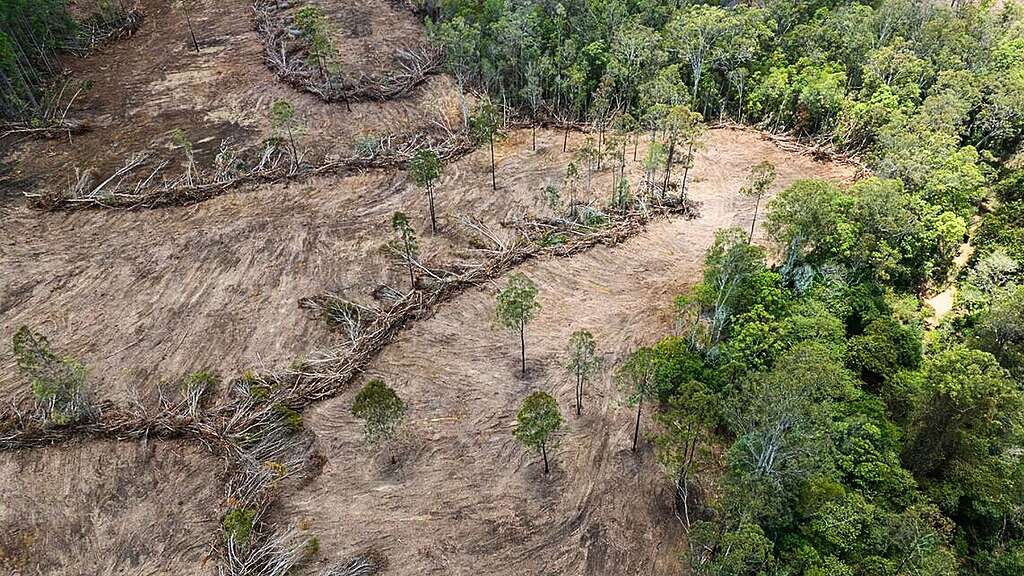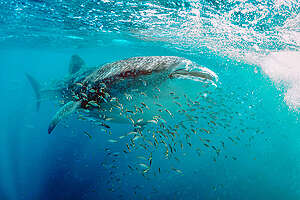Australia has one of the worst rates of deforestation in the world and the beef industry is the number one driver of deforestation in Australia. Queensland is the focal point for this deforestation, with about 90% of it due to bulldozing for pasture, primarily for beef cattle. This rampant destruction is devastating for wildlife, resulting in a native animal killed every single second. The environmental impact extends to greenhouse gas emissions, with agricultural deforestation projected to contribute 32 million tonnes of emissions in 2024, or 7% of Australia’s domestic emissions.

A native animal is killed every single second leaving many species, like the Spotted-tail Quoll, under threat.
Image: © Lachlan L. Hall / Greenpeace
The Global Shift to Deforestation-Free Agriculture
Globally, there is a rapid move towards eliminating deforestation and the destruction of natural ecosystems from agricultural supply chains. The EU is implementing stringent deforestation-free import laws, and many companies are adopting Science-Based Targets, committing to be deforestation-free by 2025. This global trend is influencing the finance sector and corporate Australia, including major beef buyers. Aldi, for instance, has pledged to eliminate deforestation and the destruction of any natural ecosystem from its supply chains by 2025. Public pressure campaigns, such as our campaign targeting McDonald’s, are also driving this shift.
The Exposure of the Australian Beef Industry
Australia is a major global producer and the second-largest beef exporter in the world, behind Brazil. Beef cattle farming covers about 50% of Australia’s landmass, which explains the industry’s disproportionate impact on the country’s forests and natural ecosystems. With primary export destinations including China, Japan, South Korea, and the United States, Australia exported $17 billion worth of beef in 2023, making it the nation’s ninth-largest export industry. However, as a significant driver of deforestation, the industry risks losing international and domestic support without rapid change.

Destruction in Queensland, which has the highest rate of deforestation in Australia.
Image: © Paul Hilton / Greenpeace
3 steps to Aussie beef without bulldozers
To make Australia’s beef industry more environmentally sustainable, three key steps are necessary:
1. Strong Deforestation-Free Corporate Commitments:
Australia’s biggest beef buyers need to commit to eliminating deforestation and the destruction of natural ecosystems from their supply chains by the end of 2025. This commitment will send a strong market signal that deforestation is unacceptable. While Aldi has the strongest commitment among the major beef buyers, more needs to be done. Check out our deforestation scorecard to see where companies stand, and join us in urging the CEOs of the big beef buyers to take action.
2. A National Deforestation-Free Verification System:
A significant issue is the lack of sufficient tracking of livestock from their origins to the slaughterhouses, resulting in little accountability in the beef supply chain. Establishing a national verification system that tracks and monitors deforestation in supply chains is crucial. Australia already has one of the best biosecurity systems globally, involving microchipping and tracing livestock. Pairing this with deforestation data and oversight from a multi-stakeholder group, including environmental organisations, could create an effective system. We’re currently lobbying the Federal Government to establish such a system
3. Stronger National Nature Laws:
The Federal Government is currently overhauling Australia’s national nature laws. Tightening regulations around agricultural deforestation will force the industry to change rapidly. Sign our petition to urge the Federal Government to act and email your local MP to call for an end to agricultural deforestation by 2025.
Join the Campaign
By fighting for these solutions, we can ensure a future where Australia’s beef industry continues without devastating our precious forests and wildlife. Join us in advocating for stronger corporate commitments, a national verification system, and robust nature laws. Together, we can achieve beef without bulldozers and protect our environment for generations to come.


